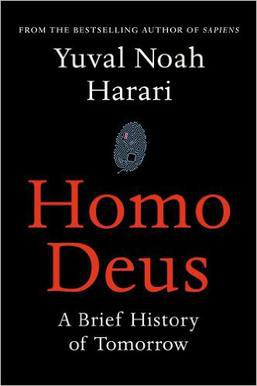 The first book of the Israeli historian Yuval Noah Harari Sapiens: A Brief History of Humankind made The New York Times Best Seller list and won the National Library of China’s Wenjin Book Award for the best book published in 2014. It is a panoramic view of the human history from a surprising angle. While the history taught in schools mostly tells it as a chain of events, Harari tried to look at the species development as a product of several revolutions – cognitive, agrarian, industrial.
The first book of the Israeli historian Yuval Noah Harari Sapiens: A Brief History of Humankind made The New York Times Best Seller list and won the National Library of China’s Wenjin Book Award for the best book published in 2014. It is a panoramic view of the human history from a surprising angle. While the history taught in schools mostly tells it as a chain of events, Harari tried to look at the species development as a product of several revolutions – cognitive, agrarian, industrial.
The second book reiterates a few of the first book’s points and I think these are the best parts. For example, did you know that in Babilon swathes of the country were owned by gods via temples? Concerning history, Harari is on familiar ground. However, his attempts to continue the imaginary line of Homo sapiens development into the future is much less successful. He overpromises and underdelivers in the second book.
Harari tells you that humanism is a religion, declares its crisis as evidenced by old people stuck in the limbo of ill health and institutions for decades and promises to reveal what will come after humanism. I can accept the historian’s view that humanism is a religion, but he dismisses the great and good humanist proponents with nary an argument: “Dawkins and Hawkins are still humanists but they are wrong”. Why? How?
Harari similarly brazenly dismisses the rise of fundamentalist Islam, arguing that absence of guidance on emerging technologies such as nanotechnology makes it irrelevant to the future. But the refusal of religions to accept the new technologies is a time-honored stance – just look at the Mennonites and Jehova witnesses. The rejection of modern world and call to return to simpler and purer times are the basis of Wahhabism that is wrecking havoc around the world.
The author also writes that humanism will be replaced by informatism – a movement that considers everything in the world information flow. Harari – as non-specialists often do – is fascinated by technology and thinks that it doesn’t have any limitations. He presents as a groundbreaking idea that humans act according to algorithms, therefore they are algorithms. But algorithms are just set of instructions and this ‘insight’ is the familiar fallacy of projecting current level of technology onto human beings. For the 19th-century philosopher, humans were machines with pistons, for the 21st – computers.
For example, Harari describes a future algorism that will make a choice of husband for a woman. Here he makes two mistakes: he underestimates human rationality and overestimates algorithm efficiency. If the hypothetical woman in the past did not listen to the best sources of advice, parents and friends, in choosing her suitor (consider Natasha Rostova behaviour or any number of fictional and real-life examples you know), there’s a little chance that she will blindly follow the algorism suggestions.
And the infallibility of an algorism is not more probable than a car that never breaks down. Let me give you a real-world example. I am a customer of Netflix. The Netflix algorism that suggests new films based on my past choices. Despite judging my taste on the basis of hundreds of picks and ratings I’ve already made (I watch a lot of TV), the algorithm often dismisses the films I like and recommends with high confidence something that I cannot watch for more than 10 minutes – ‘Gilmore Girls‘.
The author’s fascination with ‘latest discoveries’ is especially prominent in the discussion of cognitive processes. Harari wholeheartedly buys the idea that recent experiments showing brain activity before a conscious decision is made confirm the absence of free will. He thinks that in the description of the mechanism of these processes we can only choose between stochastic (random) or deterministic and neither of them can lead to the free will. This is an oversimplification. For example, the weather is both deterministic (air flows from the areas of high pressure to the areas of low pressure) and stochastic (local conditions depend on many factors) and even the best modern supercomputers predict the outcome with the high degree of uncertainty. Harari doesn’t discuss emergent phenomena – when the behavior of a whole is different from the sum of its parts – and the human brain is an emergent.
The denial of free will goes beyond theoretical and has implication in the real world. Modern philosopher of mind Thomas Metzinger – who thinks that processes in the human brain are both stochastic and deterministic – writes that there are already studies showing that people convinced of the free will absence, make fewer altruistic and more selfish decisions. It seems that those who were afraid of the death of God god because of ensuing moral havoc should have been more scared of the free will demise.
Finally, according to ‘Homo Deus’, the future will be extremely bleak. Having abandoned humanism, the people will slavishly follow whatever algorithms and the AI tell them. There will be few enhanced, fabulously rich Homo deus (humans as gods) tweaking the algorisms, but the rest of us will have no jobs, opportunities or purpose. As if all the social revolutions including in the Middle Eastern ones that the author never mentioned have never happened.
Would I recommend reading the book? Yes if you don’t have anything more rooted, but keep in mind that it’s not a scientific book but rather a controversial speculation.
Advertisements Share this:




